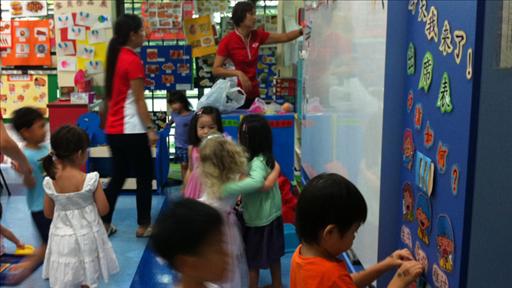By SARAH TILTON AND JOANNE LEE-YOUNG
Michael Roemer had never lived abroad before he took a one-year leave of absence from his job as an attorney, rented out his family's Orinda, Calif., house, and moved to Chengdu, a city in western China, in 2010 with his wife and two children.
Mr. Roemer's goal: to give his kids, Erin and Conor, an up-close look at China and an edge in what is fast becoming a must-learn language. "Speaking Mandarin is important," says the 57-year-old Mr. Roemer.
The Roemers are among a growing group of Westerners going to great lengths to give their kids a leg up in Mandarin. With China's rising global influence, these parents want their children to be able to communicate fluently with the country's 1.3 billion people. The phenomenon is similar to what happened in the '80s, when Japan's economy boomed and there was a rush to learn Japanese.
But this time, after-school classes aren't enough for some people. Families are enrolling their children in Mandarin-immersion programs that are springing up from California to Maine. They are hiring tutors, Skyping with teachers in Beijing and recruiting Chinese-speaking nannies. Some are stocking their playrooms with Disney videos in Mandarin—not to mention the iPhone apps aimed at making kids into Mandarin speakers.
Of learning Mandarin, Mr. Roemer says, "mastering that challenge gives [the kids] a great deal of confidence." Learning Chinese, he adds, is "good for the brain." Still, he says it was stressful watching his children struggle in a place where at first they didn't understand much of what was happening at school.
Now back in the U.S., the Roemer kids say they value that year in China learning Mandarin, even if they can't quite keep it up now. "It was cool living in a foreign country" for a year, though achieving command of Mandarin's tones remains difficult, says Erin, age 9. Her 11-year-old brother Conor says he likes being able to switch into a different language when he doesn't want other people—like his father—to understand. "Sometimes my dad doesn't know as much as we do, so if we're talking about his birthday present we can keep it from him," Conor says.
Recruiters say Mandarin gives candidates an edge in the job market. "When it comes to Mandarin speakers, we don't have them [in the U.S.], so does it give you a competitive advantage to have it? The answer is yes," says Michael Distefano, a Los Angeles-based senior vice president at executive recruiting firm Korn/Ferry International . Mr. Distefano's own son is studying Mandarin in high school, with an eye towards possibly working in Asia.
Jim Rogers, 69, and his wife, Paige Parker, 43, sold their New York City home and moved to Singapore in 2007, specifically so their children could grow up speaking Chinese. The couple now rent a house across from Singapore's Botanic Gardens. The address positioned them to get their 9-year-old daughter, Happy, into a top local school called Nanyang Primary, where core subjects are taught in Mandarin. Her sister, Bee, 4, attends Nanyang Kindergarten, where instruction is completely in Mandarin for two years.
Mr. Rogers, who started Quantum Fund with financier George Soros, doesn't know Mandarin and had never lived in Asia. But he says it's crucial for his kids to learn Chinese naturally from the start. "This is going to be the century of China, so we're preparing them," he says.
Mandarin is notoriously difficult to learn. The language is tonal, and fluency requires mastering thousands of characters. Mandarin competence takes 2,200 class hours, with half of that time spent in a country where it's spoken, according to the U.S. State Department's Foreign Service Institute, whereas Spanish can be learned in 600 to 750 class hours.
Educators say there's no one right way to learn Mandarin. Jeff Bissell, head of the Chinese American International School in San Francisco, says teaching is "evolving" as metrics and standards are established. He applauds efforts to get students to China to learn Mandarin, which he calls "a major strategic priority."
What happens after moving back from China is another matter. Jim Cashel and his wife, Anne Ching, a fourth-generation Chinese-American who never learned Mandarin growing up, moved from Sonoma, Calif., to Chengdu in 2009 with their two daughters. Their goal: to learn Chinese and experience China.
Since moving back to Sonoma in 2010, Ms. Ching and her older daughter regularly Skype with a teacher in Chengdu to maintain their Mandarin. But there's no real chance to practice Mandarin otherwise, acknowledges Ms. Ching. "My whole approach is I'm just going to keep working on it for the next decade," she says.
Among parents considering a move to Asia for a year is Jeff Baird, a hedge-fund manager who lives in Berkeley, Calif. In April, he took his wife and two daughters, ages 3 and 6, on a tour of Taipei and Singapore to see schools and research the idea.
His wife, Millie Chu-Baird, is Chinese-American but can't read or write Mandarin, having grown up in Columbus, Ind. "More than just instilling Mandarin into them, we would want it to be about giving them the joy of experiencing the language overseas," says Mr. Baird.
In Singapore, the Bairds visited Mr. Rogers, Ms. Parker and their daughters to discuss the best place to learn Mandarin. As the playdate progressed, Happy Rogers was asked to name the hardest thing about learning Mandarin. She replied, in Mandarin: "Oral tests. And composition. And comprehension. And Q and A."
Her mother, who doesn't speak Mandarin, stared at Happy uncomprehendingly. After a reporter translated Happy's answer, her mother said, "So basically, everything?"
"Yes," Happy nodded.
A version of this article appeared June 27, 2012, on page D3 in the U.S. edition of The Wall Street Journal, with the headline: To Improve Kids' Chinese, Parents Head to Asia.











![[image]](https://iza-server.uibk.ac.at/pywb/dilimag/20210113092156im_/http://si.wsj.net/public/resources/images/OB-TN746_barcla_A_20120627090819.jpg)
![[image]](https://iza-server.uibk.ac.at/pywb/dilimag/20210113092156im_/http://si.wsj.net/public/resources/images/OB-TJ728_crt_fe_A_20120615092045.jpg)
![[image]](https://iza-server.uibk.ac.at/pywb/dilimag/20210113092156im_/http://si.wsj.net/public/resources/images/OB-TN840_0627ne_A_20120627133659.jpg)
![[image]](https://iza-server.uibk.ac.at/pywb/dilimag/20210113092156im_/http://si.wsj.net/public/resources/images/EI-BU094_EUSUMM_A_20120627143952.jpg)
![[OB-TK448_0618sc_C_20120618103236.jpg]](https://iza-server.uibk.ac.at/pywb/dilimag/20210113092156im_/http://si.wsj.net/public/resources/images/OB-TK448_0618sc_C_20120618103236.jpg)
![[image]](https://iza-server.uibk.ac.at/pywb/dilimag/20210113092156im_/http://si.wsj.net/public/resources/images/MK-BV268_AMAZON_C_20120626170823.jpg)
![[image]](https://iza-server.uibk.ac.at/pywb/dilimag/20210113092156im_/http://si.wsj.net/public/resources/images/P1-BG795_AMEROI_C_20120626170744.jpg)
![[image]](https://iza-server.uibk.ac.at/pywb/dilimag/20210113092156im_/http://si.wsj.net/public/resources/images/PJ-BI127_DSOLUT_C_20120626190007.jpg)





Most Recommended
“If there is nothing to hide, the...;”
“Mr Harrop: With due respect, I...;”
“"but the TEA-Republicans ha...;”
“Ms Noonan...Apparently you have...;”
“"The Attorney General is...;”